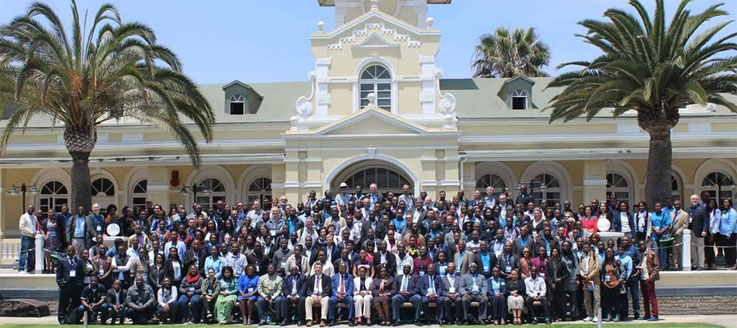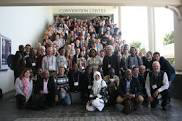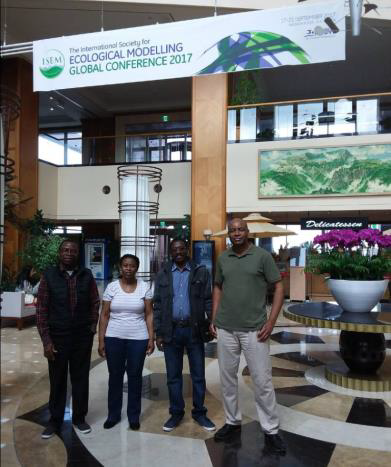News

Specific Objective(s) Addressed: 6.1 Participate in UNESCO Science Sessions.
The Chair-holder participated as member of the steering committee for workshop on gender-responsive Science, Technology and Innovation (STI) policies and governance strategies for sustainable development, held in Windhoek, Namibia from 19 to 21 July 2017. The workshop was organised by UNESCO Regional Office for Southern Africa and UNESCO Windhoek Office; and co-hosted with the Government of Namibia.
The workshop provided platform for the delegates to share ideas and good practices and recommend strategies for engendering national and regional STI policy systems and governance strategies. Implementation of the strategies recommended can ensure gender-responsive STI policies to enhance inclusive growth and sustainable development at all governance levels.
The Chair also attended the 25th anniversary celebrations of the University Twinning and Networking (UNITWIN)/UNESCO Chairs Programme. The celebration, attended by UNESCO Chairs and UNITWIN Coordinators, was organised as special event of the 39th Session of the General Conference of UNESCO. The event took place on 31 October 2017 at the UNESCO Fontenoy Building, in Paris.
This celebration provided an opportunity to review the achievements of the Programme over 25 years of action and to look forward to the contribution of UNESCO Chairs and UNITWIN Networks to the 2030 Agenda for Sustainable Development.
The Chair team also submitted one‐page slide presentation illustrating the most significant and recent activities and future projects of the Chair within the framework of the 2030 Agenda for Sustainable Development. The slide was included in a presentation compiled by the UNITWIN office to illustrate both achievements and future prospects of the UNITWIN/UNESCO Chairs Programme.
Specific Objective(s) Addressed: 1.3 Evaluation of the efficiency of freshwater augmentation technologies implemented in drought-prone and flood-prone areas; and 5.3 Publish the scientific and policy-related results.
The Chair-holder presented a paper in Symposium Session 2, i.e. “Energy systems theory and emergy evaluation applied to analyze and understand changes in ecological systems” on Monday, 18 September 2017, 16:00-17:40 in Ramada Ballroom 2.
The abstract below is part of the Symposium Proceedings:
1. Kgabi N.A., The energy-water extricable link for arid regions: Case of Namibia, International Society for Ecological Modelling (ISEM) Global Conference, Jeju, South Korea, 17 - 21 September 2017.
The other output is in the form of collaboration and/or capacity development discussion with colleagues from Germany and the United States of America (USA) on the water-energy nexus in arid environments. The ultimate outcome is thus, the Volkswagen funded “SDG6 Summer School” for masters and doctoral students to be hosted by the Chair at NUST in November/December 2018.

Specific Objective(s) Addressed: 1.1 Correlations analysis of water quality, air quality and meteorological parameters in the different basins in arid areas; and 5.3 Publish the scientific and policy-related results
The Chair served in the Local Organising Committee of the WaterNet/WARFSA/GWP-SA Symposium from February to October 2017.
Several members of the Chair Team also participated in general sessions of the Symposium.
The output/abstracts are listed below:
1. H.R. Amwele, T.M. George, S.K. Kristof, N.A. Kgabi, W.L. Kachele, Heavy Metals Accumulation in Freshwater and Human Exposure Assessment Using Hydrocynus Vittatus from Okavango River, 18th WaterNet/WARFSA/GWP-SA Symposium, Swakopmund, Namibia, 25 – 27 October 2017
2. Ananias Akweetelela, Kgabi Nnenesi Anna, Zivuku Munyaradzi, Damas Mashauri, Investigation of Environmental Radioactivity of Selected Water Bodies in the Kuiseb and Okavango-Omatako Basins, Namibia, 18th WaterNet/WARFSA/GWP-SA Symposium, Swakopmund, Namibia, 25 – 27 October 2017
3. Petrus Tuhafeni Paulus, Nnenesi Anna Kgabi, Henry Mukendwa, Geochemical Analysis of Groundwater in the Omaruru-Swakop Basin, Namibia, 18th WaterNet/WARFSA/GWP-SA Symposium, Swakopmund, Namibia, 25 – 27 October 2017
4. W.L. Kachele, N.A. Kgabi, H. Amwele, Investigating Possible Heavy Metal Contamination in Sea Water and Freshwater in Namibia, 18th WaterNet/WARFSA/GWP-SA Symposium, Swakopmund, Namibia, 25 – 27 October 2017

Specific Objective(s) Addressed: 1.1 Correlations analysis of water quality, air quality and meteorological parameters in the different basins in arid areas; 2.1 Develop water-air-climate models for the arid environment; 5.3 Publish the scientific and policy-related results; and 6.1 Participate in UNESCO Science Sessions.
The Chair Team made two oral presentations in the “Understanding spatio-temporal variability of water resources and the implications for IWRM in the semi-arid east and southern Africa” session, co-convened by WaterNet and UNESCO, and one poster presentation in the “Probabilistic forecasts and land-atmosphere interactions to advance hydrological predictions” Session.
The following abstracts of the Special Session are part of the Symposium Proceedings:
1. Kgabi N, Uugwanga M, Ithindi J, Knoeller K, Atekwana E, Motsei L, Mathuthu M, Kalumbu G, Amwele H, Uusizi R, Isotopic composition and elemental concentration of water bodies in the Kuiseb and Cuvelai-Etosha Basin, Namibia, IAHS Scientific Assembly 2017, Port Elizabeth, South Africa, 10–14 July 2017
2. Kgabi N, Uugwanga M, and Ithindi J, Atmospheric Conditions and Precipitation in Arid Environments: A Case of Namibia, IAHS Scientific Assembly 2017, Port Elizabeth, South Africa, 10–14 July 2017
3. Reju S, Mbokoma G, Kgabi N, Modelling the Water-Air Interactions of the Namibian Atmosphere: Meteorological Factors, IAHS Scientific Assembly 2017, Port Elizabeth, South Africa, 10–14 July 2017
The team was invited to submit the two papers for publication in the IAHS Redbook Series. One paper is currently being reviewed. The other paper could not be submitted as the results were already published in another journal.

Specific Objective(s) Addressed: 1.2 Correlations analysis of water quality and quantity, and precipitation events in the different basins in arid areas; 2.1 Develop water-air-climate models for the arid environment; 5.3 Publish the scientific and policy-related results; and, 5.4 Organize national, regional and international events and workshops.
The Chair Symposium was conducted during the International Society for Ecological Modelling (ISEM) Global Conference held in Jeju, South Korea, from 17 - 21 September 2017. The Chair Symposium was scheduled for 18 September 2017, from 10h50 to 12h40.
Presentations and discussions placed emphasis on the complex characteristics of the arid environment (i.e. the complex earth-atmospheric interactions system of high temperatures, low relative humidity, high evaporation and evapo-transpiration, low precipitation, long sunlight hours and high solar intensity) and the benefits of understanding these settings, and the opportunities for water augmentation and renewable energy programmes. The symposium opened-up academic debate and possible collaborations, for addressing the water-energy challenges of arid environments.
The following abstracts of the Special Session are part of the Symposium Proceedings:
1. Kgabi NA, Namibia University of Precipitation intensity and frequency challenges of the Arid Environment: Atmospheric Water-holding capacity, International Society for Ecological Modelling (ISEM) Global Conference, Jeju, South Korea, 17 - 21 September 2017
2. Reju SA, Mbokoma GS and Kgabi NA, Modelling the Water-Air Interactions of the Namibian Atmosphere: Meteorological Factors, International Society for Ecological Modelling (ISEM) Global Conference, Jeju, South Korea, 17 - 21 September 2017
3. Nakayama T, Maksyutov S, Long-term trend of carbon cycle in inland waters by using advanced eco-hydrologic and biogeochemical coupling model, International Society for Ecological Modelling (ISEM) Global Conference, Jeju, South Korea, 17 - 21 September 2017
4. Okorie M, Inambao F, Chiguvare Z, Wind shear coefficients and energy yields estimations of arid inland and coastal locations, International Society for Ecological Modelling (ISEM) Global Conference, Jeju, South Korea, 17 - 21 September 2017
5. Gope G, Amunyela J, Okorie M, The viability and potential value of concentrated solar power (CSP) systems for electricity generation in the Namibian environment, International Society for Ecological Modelling (ISEM) Global Conference, Jeju, South Korea, 17 - 21 September 2017
All presentations are currently being developed into full papers to be submitted in May 2018 for possible publication in the Elsevier Journal of Ecological Modelling.

Specific Objective(s) Addressed: 1.3 Evaluation of the efficiency of freshwater augmentation technologies implemented in drought-prone and flood-prone areas; 5.3 Publish the scientific and policy-related results obtained from Chair programme activities; and, 5.4 Organize national, regional and international events and workshops.
The Chair Special Session was conducted during the 18th WaterNet/WARFSA/GWP-SA Symposium, held in Swakopmund, Namibia from 25 to 27 October 2017. The Session was scheduled for 26 October 2017 from 14h00 to 17h00.
The main challenges discussed during the session centred on the impact of climatic conditions of the arid environments (i.e. high temperatures, high evaporation rates, run off and low recharge) on water augmentation programmes, viz. wastewater treatment and desalination technologies, as well as municipal water conveyance systems. Two new technologies/approaches for water treatment (Peracetic acid (PAA) and Advanced oxidation) and one new model desalination plant (single basin solar evaporator) were introduced. The session closed with a presentation on quality control of climatic data to ensure reliable meteorological/climatic baseline studies that can inform new/alternative water augmentation programmes.
The following abstracts of the Special Session are part of the Symposium Proceedings:
1. Kgabi NA, Hydro-climatic Settings and Water Augmentation Challenges of Arid Environments, 18th WaterNet/WARFSA/GWP-SA Symposium, Swakopmund, Namibia, 25 – 27 October 2017
2. Kwaambwa H, Moringa Tree: From curiosity to application in water and wastewater treatment and climate change mitigation, 18th WaterNet/WARFSA/GWP-SA Symposium, Swakopmund, Namibia, 25 – 27 October 2017
3. Garg A, Advances in wastewater disinfection, 18th WaterNet/WARFSA/GWP-SA Symposium, Swakopmund, Namibia, 25 – 27 October 2017
4. Lumaga PB, Hansmann H, Mashauri DM, Siering J, Techno-economical design of a single basin solar evaporator, 18th WaterNet/WARFSA/GWP-SA Symposium, Swakopmund, Namibia, 25 – 27 October 2017
5. Nakale SA, Sirunda J, Kgabi N, Evaluating the effectiveness of BioSprite in reducing Chlorine Demand at the Windhoek Airport Scheme, 18th WaterNet/WARFSA/GWP-SA Symposium, Swakopmund, Namibia, 25 – 27 October 2017
6. Hafeni A, Kgabi N, Hamatui N, Assessment of Conveyance Efficiency of Okahandja and Rehoboth Municipal Water Supply Systems, 18th WaterNet/WARFSA/GWP-SA Symposium, Swakopmund, Namibia, 25 – 27 October 2017
7. Kapweya A, Kgabi N, Onjefu S, Assessment of desalinating efficiency of renewable energy-operated desalination plants in Namibia, 18th WaterNet/WARFSA/GWP-SA Symposium, Swakopmund, Namibia, 25 – 27 October 2017
8. Reju SA and Kgabi NA, Wavelet Analyses and Comparative Denoised Signals of Meteorological Factors of the Namibian Atmosphere, 18th WaterNet/WARFSA/GWP-SA Symposium, Swakopmund, Namibia, 25 – 27 October 2017.
All presentations are currently being developed into full papers to be submitted in February 2018 for possible publication in the Elsevier Journal of Chemistry and Physics of the Earth.
NUST has been appointed to host the prestigeous UNESCO Chair in Sustainable Water Research from Climate Adaptation in Arid Environments for the next four years. This is the first time a UNESCO Science Chair has ever been hosted by Namibia. The other two have been in the human science disciplines.

Recent comments